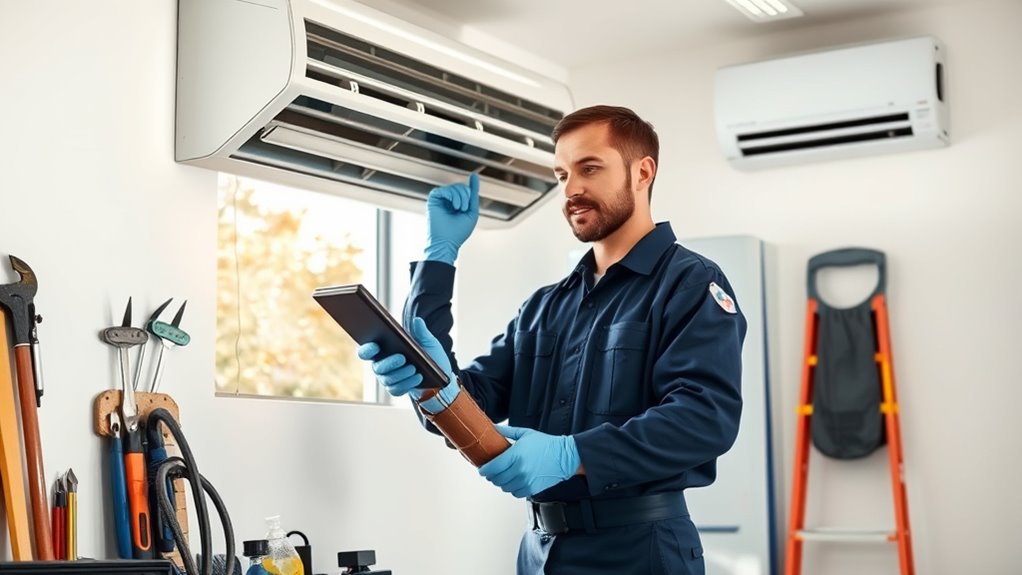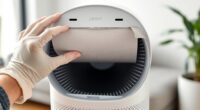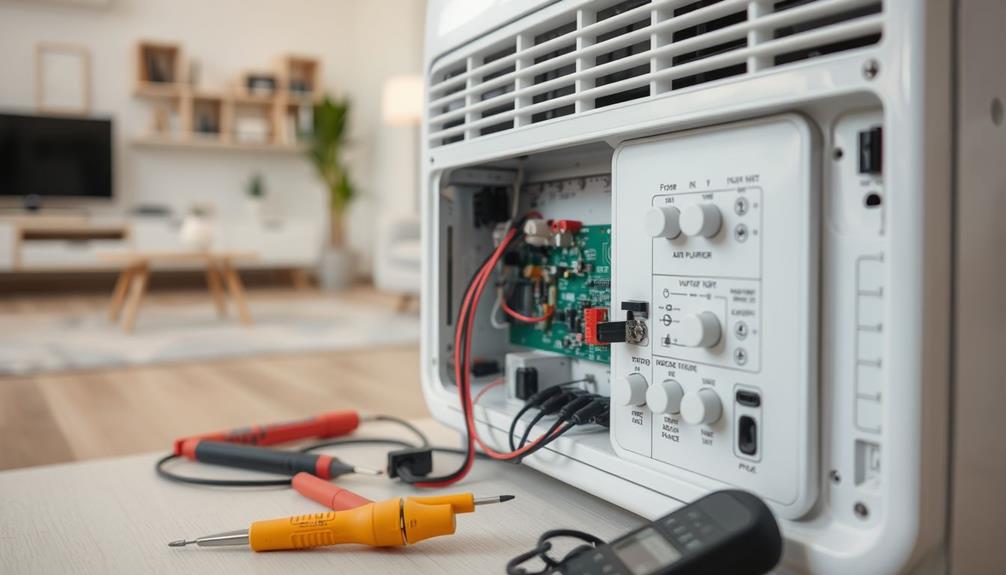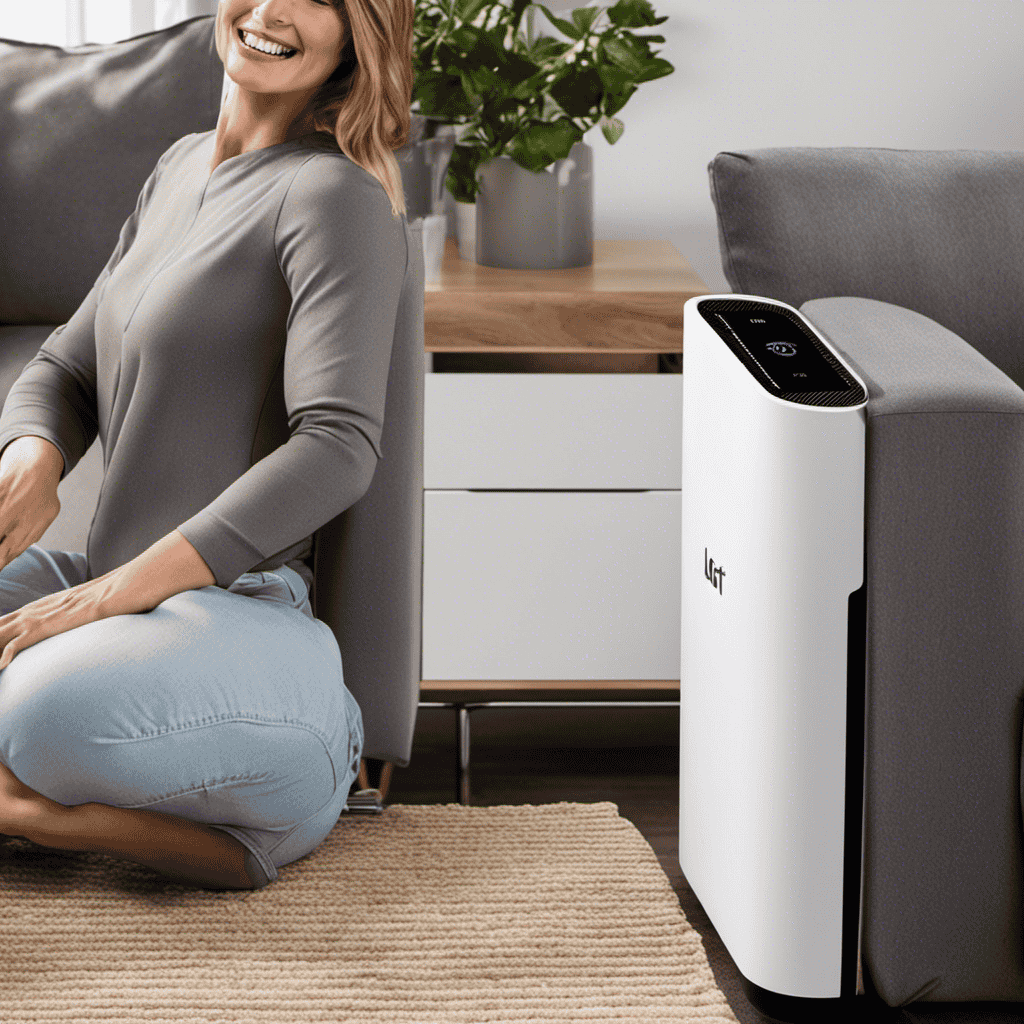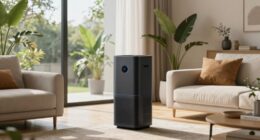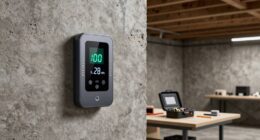Getting your HVAC ready in just 30 minutes can make a big difference during allergy season. Start by replacing your filters with high-quality HEPA or higher MERV-rated filters to trap more allergens. Then, schedule professional duct cleaning to remove dust, pollen, and mold from your system. These quick upgrades improve airflow and indoor air quality, helping reduce allergy symptoms. Keep in mind, maintaining your system regularly keeps your home healthier throughout allergy season and beyond. Discover simple steps to get started now.
Key Takeaways
- Replace or upgrade your HVAC filters to high-efficiency or HEPA filters for better allergen removal.
- Schedule professional duct cleaning to eliminate accumulated dust, pollen, and mold.
- Turn off your HVAC system before filter replacement to prevent damage.
- Check and replace filters monthly, especially during allergy season, for optimal indoor air quality.
- Perform these quick upgrades now to reduce allergens and improve comfort during peak allergy times.
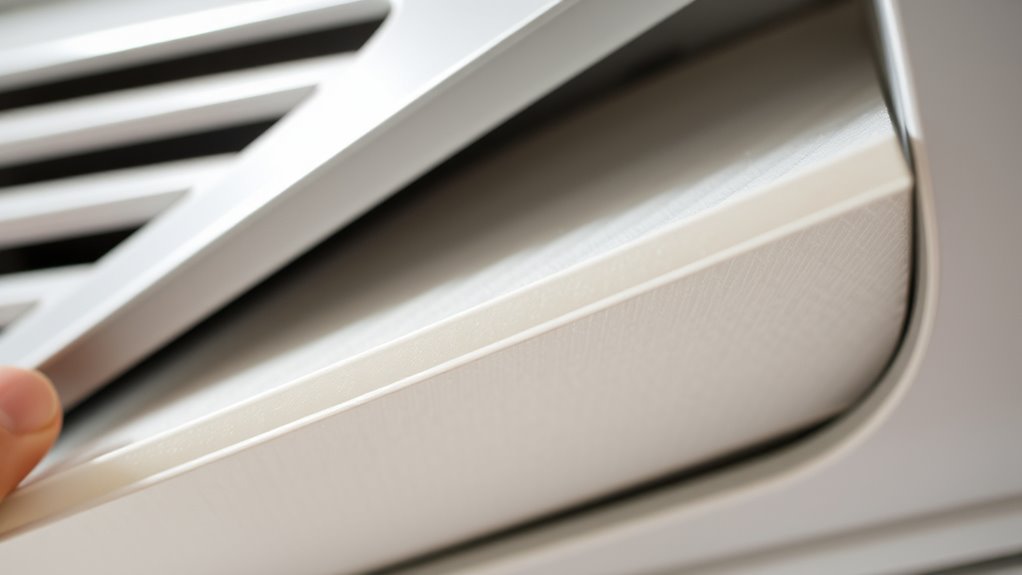
Are you ready to tackle allergy season head-on? If so, now’s the perfect time to prep your HVAC system to keep allergens at bay. In just 30 minutes, you can make a significant difference by upgrading your air filters and scheduling duct cleaning. These simple steps ensure your home’s air quality is better equipped to handle pollen, dust, pet dander, and other common irritants that spike during allergy season.
Start by focusing on your air filter upgrades. Your current filters might be doing the bare minimum, but upgrading to a high-efficiency particulate air (HEPA) filter or a filter with a higher MERV rating can trap much smaller particles. These filters are designed to catch allergens that standard filters often miss, providing cleaner air throughout your home. Remember to turn off your HVAC system before replacing the filter to avoid causing any damage. Once installed, check your filter monthly and replace it more frequently during allergy season to maintain peak filtration. This small upgrade can drastically reduce airborne allergens, helping you breathe easier, especially if you or your family members suffer from allergies or asthma.
Next, consider scheduling duct cleaning. Over time, dust, mold, pollen, and other debris accumulate inside your ductwork. When your system runs, these irritants are blown into your living spaces, exacerbating allergy symptoms. Duct cleaning removes these buildups, improving airflow and reducing the spread of allergens. While it might seem like a larger task, many professional duct cleaning services can complete the job quickly and efficiently. This step not only enhances your system’s efficiency but also ensures that the air circulating in your home is as clean as possible. If you haven’t had your ducts cleaned in a while, or if you notice more allergy symptoms than usual, this is an excellent move to make now.
In addition, understanding retirement planning options can help you budget for necessary home improvements like HVAC upgrades, ensuring your home remains a healthy environment well into the future. Combining air filter upgrades with duct cleaning is a powerful way to prepare your HVAC system for allergy season. These steps work together to improve indoor air quality, reduce allergens, and increase the efficiency of your system. Taking just half an hour now can save you from dealing with allergy flare-ups later. Regular maintenance, like changing filters and cleaning ducts, ensures your home remains a safe, healthy environment. So don’t wait—invest in these quick upgrades today and breathe easier all season long.
Frequently Asked Questions
How Often Should I Replace My HVAC Filters During Allergy Season?
During allergy season, you should replace your HVAC filters every 30 to 45 days to maximize allergen removal. This helps maintain proper filter lifespan and keeps allergens from circulating in your home. Check your filters regularly, especially if you have pets or if your home is dusty. Replacing filters on schedule guarantees your system runs efficiently and effectively reduces allergens, improving your indoor air quality during peak allergy times.
Can HVAC Maintenance Reduce Allergy Symptoms Effectively?
Think of HVAC maintenance as a invigorating gust of fresh air for your home. Yes, it can effectively reduce allergy symptoms by improving indoor air quality. Regular filter changes and HVAC troubleshooting clear out dust, mold, and pollen, making your environment healthier. When you stay on top of maintenance, you prevent indoor allergens from building up, giving you relief and peace of mind during allergy season.
What Signs Indicate My HVAC System Needs Immediate Servicing?
If your HVAC shows signs like weak airflow, strange noises, or inconsistent temperatures, it likely needs urgent servicing. Airflow blockages caused by dirt or debris can reduce efficiency and worsen indoor air quality. Additionally, thermostat issues may lead to inaccurate temperature control. Address these problems promptly to guarantee your system operates smoothly, improve air circulation, and prevent bigger repairs later. Don’t ignore signs—regular maintenance keeps your HVAC running at its best.
Are There Specific Air Purifiers Recommended for Allergy Relief?
Imagine breathing easier during allergy season—sounds great, right? The secret lies in choosing the right air purifier brands for allergy relief. Some top options, like Dyson, Molekule, and Blueair, are designed to trap airborne allergens effectively. These purifiers use advanced filters to remove pollen, pet dander, and dust, giving you cleaner air. Investing in a quality air purifier can transform your space into a haven of relief this allergy season.
How Does Humidity Control Impact Allergy Symptoms Indoors?
Controlling humidity levels indoors substantially impacts your allergy symptoms. Using a humidifier benefits you by maintaining ideal humidity, usually between 40-50%, which helps reduce dust mites and mold growth. Proper humidity improves indoor air quality by preventing dry, irritated nasal passages and skin. When humidity is well-managed, allergens are less likely to thrive, making your environment more comfortable and allergy-friendly during peak seasons.
Conclusion
Don’t wait until allergy season hits to get your HVAC ready. Spending just 30 minutes now can greatly reduce pollen and dust in your home, making breathing easier. You might think it’s a hassle, but the relief and comfort you’ll enjoy are totally worth it. Plus, a quick check now can prevent costly repairs later. Take action today—your lungs and your wallet will thank you for it!
